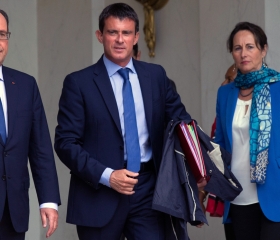Several days ago France saw one more cabinet of ministers disbanded. Frantically trying to return quickly disappearing confidence and breathe new life into the country’s stagnating economy, French President François Hollande is also playing quite the ambiguous role in the settlement of the Ukraine conflict. We met with RIAC Expert Yuri Rubinsky, PhD in History, Professor at the Higher School of Economics, to discuss the motives and the rationale for France's involvement.
Several days ago France saw one more cabinet of ministers disbanded. Frantically trying to return quickly disappearing confidence and breathe new life into the country’s stagnating economy, French President François Hollande is also playing quite the ambiguous role in the settlement of the Ukraine conflict. We met with RIAC Expert Yuri Rubinsky, PhD in History, Professor at the Higher School of Economics, to discuss the motives and the rationale for France's involvement.
Dr. Rubinsky, how would you describe France's approach to the events in Ukraine and is Paris seriously mediating in order to settle the crisis?
France and French leaders are paying considerable attention to Ukraine and joined Germany at the top and foreign minister levels to handle the issue. Recently French Foreign Minster Laurent Fabius participated in contacts between Russia, Ukraine and EU leaders.
France's stance is matched to that of Angela Merkel and the European Union, although Paris somewhat differs on the sanctions declared by the EU and the United States. The 2011 contract for four Mistral ships – actually two, as of today – used to be very lucrative for French military shipbuilding, especially because of stagnation and growing unemployment. But now the deal has acquired quite a new dimension. While previously the contract was seen as part of the Russia-NATO partnership, it has now fallen out of favor, and France has become stuck vis-à-vis its partners, primarily the U.S.A. and Great Britain, who have insisted that France give up the deal and even promised to compensate it for the financial losses. On the other hand, France has definitely been under pressure, which President Putin also stated recently. Paribas, France's largest bank, was ruthlessly fined by an American court for violating long-term embargoes against Cuba, Iran and Sudan. This was just a pretext, but the sum – about 9.5 billion dollars – is astonishing. The West would like to harmonize sanctions so that each NATO and EU member contribute its share and pay for the consequences. France is still hesitant. Disobeying the demand would not mean only incur financial damage, but also the loss of its independent role in the Ukraine settlement and East-West relations. French leaders do not appear ready for that. The first Mistral carrier is likely to be delivered to Russia, while future shipments, according to Mr. Hollande, will hinge on the development of Ukraine crisis. In reality, Germany is the key player in Europe and France supports it, at the same time trying to concentrate on the EU's southern periphery, i.e. the Mediterranean, the Middle East and Africa. This is why France does not want to get too deeply involved in the Ukraine crisis, since it is short on resources and levers.
Do you think France will work to have the sanctions cancelled?
Not likely, if it has to act alone. Paris will harmonize its posture primarily with Berlin and the European Union and consequently with Washington. France is not ready to go out on its own, and its domestic political environment is also quite tricky. A new government was established only after 147 days following the appointment of Manuel Valls as prime minister because of a split in the government and the leftwing parliament majority. The country’s economy is in really bad shape, with meager growth, high unemployment and popular discontent, the loss of two municipal elections running, followed by the lost European Parliament elections. All of these problems are impeding Paris's freedom of movement and pushing it toward compensating for its domestic challenges with foreign initiatives, although in areas of its primary interest. This concerns its military presence in its former African colonies like Mali and Central African Republic. As for Eastern Europe, France is rather reserved since it regards the expansion of the EU membership as a threat rather than a gain, both for economic and structural reasons.
What can you tell us about Russian-French relations which used to be relatively positive in nature?
The French media are uncommonly cool toward Russia. This is hardly specific to France in view of its foreign policy strategy. The phenomenon is related to France's role as the homeland of human rights and democracy which has always been typical for French diplomacy, its establishment and the entire society. Before the Ukraine crisis, the Arab Spring cast a shadow on the bilateral relationship. The civil wars in Libya and Syria placed Moscow and Paris on the opposite sides of the barricades. In this case, the French seem to have made a mistake by placing their bet on the losing side in both countries. Nevertheless, France is Russia's most important negotiation partner, i.e. in the Middle East, the Arab-Israeli conflict, Iranian nuclear dossier and many other issues, among them climate, international terrorism and many other international matters. France has been historically close to Russia on these issues. Tensions in the international environment have significantly aggravated, but we are far from a breakup when dialogue is impossible. France will never renounce its solid and reliable partnership with Russia.
Interviewer: Maria Gurova, RIAC Program Assistant





